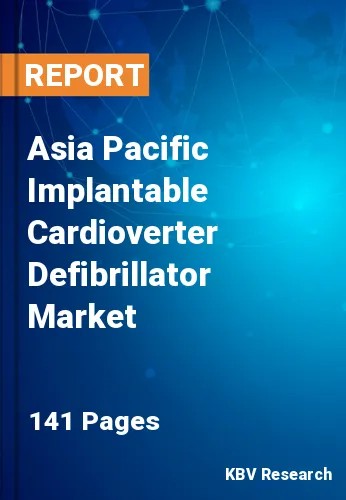The Asia Pacific Implantable Cardioverter Defibrillator Market would witness market growth of 6.9% CAGR during the forecast period (2023-2030).
Healthcare providers can better tailor ICD settings to individual patient needs, reducing unnecessary shocks and improving overall outcomes. The development of MRI-compatible ICDs has been a significant trend, as it allows patients with ICDs to undergo essential diagnostic procedures without the risk of device interference. Leadless ICDs have gained attention as a potentially less invasive alternative to traditional ICDs with leads. These devices are implanted directly into the heart and can reduce lead-related complications.
Technological innovations in ICD design have led to more efficient and smaller devices, improved battery life, and enhanced arrhythmia detection capabilities. These advancements make ICDs more appealing to both patients and healthcare providers. ICDs have become smaller and more compact due to technological advancements, which have led to their miniaturization. Smaller device sizes have reduced the surgical implantation procedure's invasiveness and improved patient comfort. ATP is a feature in many ICDs that delivers pacing pulses to terminate certain ventricular arrhythmias without shocks.
According to the National Library of Medicine, one in ten Indians over 18 has elevated blood glucose levels. In 2017, India had the highest number of diabetes cases globally, at 73 million. With a prevalence of 8.8% between the ages of 20 and 70 in India, diabetes has become a challenge. The rising incidence of diabetes and other non-communicable diseases has been linked to accelerated urbanization, globalization, and an increase in sedentary lifestyles, unhealthy diets, overweight and obesity, tobacco use, and life expectancy. Due to such factors, the market will grow in this region.
The China market dominated the Asia Pacific Implantable Cardioverter Defibrillator Market, By Country in 2022, and would continue to be a dominant market till 2030; thereby, achieving a market value of $402.5 million by 2030. The Japan market is showcasing a CAGR of 6.3% during (2023 - 2030). Additionally, The India market would register a CAGR of 7.6% during (2023 - 2030).
Based on Type, the market is segmented into Biventricular Devices, Dual Chamber ICDs and Single Chamber ICDs. Based on Product Type, the market is segmented into Transvenous and Subcutaneous. Based on NYHA Class, the market is segmented into NYHA Class II and NYHA Class III. Based on End-Use, the market is segmented into Hospitals, Ambulatory Surgical Centers and Others. Based on countries, the market is segmented into China, Japan, India, South Korea, Singapore, Malaysia, and Rest of Asia Pacific.
Free Valuable Insights: The Global Implantable Cardioverter Defibrillator Market is Predict to reach $5.6 Billion by 2030, at a CAGR of 6.1%
The market research report covers the analysis of key stake holders of the market. Key companies profiled in the report include Abbott Laboratories, Medtronic PLC, Biotronik SE & Co. KG, Boston Scientific Corporation, MicroPort Scientific Corporation, Stryker Corporation, ZOLL Medical Corporation (Asahi Kasei Corporation), LivaNova PLC, Koninklijke Philips N.V. and Getinge AB.
By Type
By Product Type
By NYHA Class
By End-use
By Country
Our team of dedicated experts can provide you with attractive expansion opportunities for your business.

